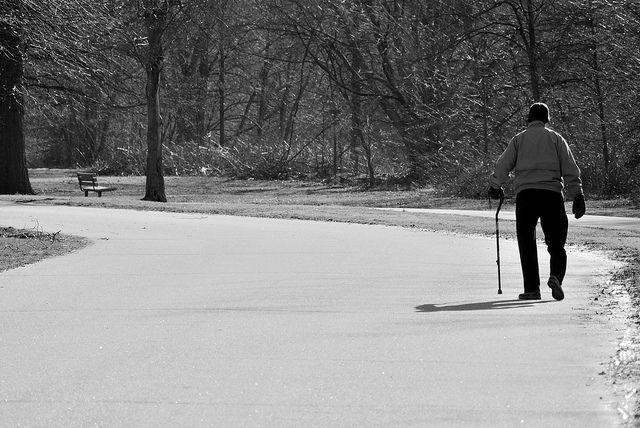Should We Tag Alzheimer's Patients With GPS Trackers?

You can use GPS to track a stolen car or cellphone ... so why not a lost and confused granny with dementia?
In a set of commentaries published today in the British Medical Journal (BMJ), two UK geriatric specialists debate the merits and ethical consequences of using personal GPS devices to monitor the whereabouts of elderly patients with dementia.
Like in the United States, the rates and costs of dementia in the UK are escalating at a frightening pace. Financial burden of the disease was over £23 billion ($35 billion) in 2012 and is expected to climb as more and more baby boomers reach the age of retirement. It is estimated that 200,000 more Brits will develop dementia in the next eight years, raising the nation's tally to over one million people. Alzheimer's disease, the most common form of dementia, accounts for 60 to 80 percent of cases.
Providing the proper care for someone who is losing his or her memories can be a challenge. One common problem with the disease is wandering.
Some, but not all, patients with dementia are prone to losing track of where they are. Overall, only one percent of patients are hurt while lost, but their chances of injury rise dramatically the longer that they are missing.
"Half of all people with dementia who are missing for more than 24 hours die or are seriously injured," wrote psychiatrist Dr. Rupert McShane of Oxford University, who was referencing one of his own studies. McShane argued in favor of using tracking devices for dementia patients in his BMJ commentary.
He explains that 40 percent of dementia patients get lost at some point, but the real danger is with those who repeatedly wander away from their families, private caretakers, or nursing homes. This repetitive behavior happens in five percent of patients. It can strain family ties and lead to resentment between caretakers and dementia sufferers.
GPS trackers, such as wristbands and cellphone apps, can reduce this conflict, according to McShane. Some trackers are small pocket-sized gadgets that cost as little as £15 ($23).
Although this practice offers a safety net for patients and caregivers, it raises some obvious ethical concerns.
Advocating against GPS trackers is Dr. Desmond O'Neill, a professor of geriatric medicine at Trinity College Dublin, Ireland.
O'Neill argues that trackers objectify and disempower those with the disease. Not all dementia patients are at risk for wandering, so if trackers become popular, there's a chance that people will use them even when they aren't needed. He is also concerned that trackers could instill complacency and a false sense of security in caregivers. What if the device fails or the patient removes it?
Public surveys on the issue have leaned too heavily on interviewing caregivers, according to O'Neill, without sufficiently considering the opinions of people with the disease.
"Canvassing the views of people who are cognitively intact is not a substitute for engagement with those with dementia, as like carers [i.e., caregivers] they favor safety over autonomy," wrote O'Neill.
One of his most interesting points revolves around the idea that "as with all behavior, wandering is not a disease but a form of communication."
"The key goal of good dementia care is to interpret and respond to what is driving the wandering," wrote O'Neill.
Rather than simply tracking the patient, he supports a "reciprocal messaging" system "with lamps that light with motion transmitted from both the patient's and the carer's homes." This would eliminate the "big brother" aspects of electronic surveillance, while allowing the patient to retain a sense of autonomy. O'Neill also suggests that the merits of electronic tagging over traditional methods, like identity bracelets, have not been sufficiently demonstrated.
Both McShane and O'Neill suggest that more research is needed to determine just how GPS tracking or alternative strategies can improve patient care.
Surrey, a county located southwest of London, may be the perfect place to conduct a future case study. The BBC reported today that GPS trackers will be issued to Surrey residents with dementia and learning difficulties.
"The devices send a text alert to a family member or carer once they reach a pre-set speed and the message includes a link to Google maps," according to the report.
What's your opinion? Would you be OK with tracking a loved one with dementia? Or do you think it's an unnecessary sacrifice to autonomy? Feel free to leave your comments below.
Sources: McShane R. Should patients with dementia who wander be electronically tagged? Yes. BMJ. 2013.
O'Neill D. Should patients with dementia who wander be electronically tagged? No. BMJ. 2013.



























